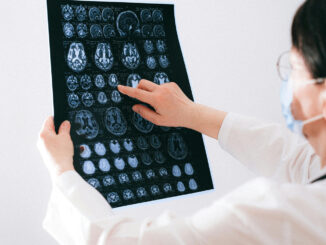
Dementia is the leading cause of death in the UK, with 900,000 of the population suffering from some form of dementia – Alzheimer’s being the most prevalent.
Although dementia in all its forms generally impacts those over the age of 65, recent statistics show that early onset dementia impacts 42,000 people in the UK under the age of 65.
However, recent pioneering studies, techniques and even everyday products may now be bringing hope for families and patients suffering with this disease.
Dr Deborah Lee, a medical writer for Dr Fox Online Pharmacy, worked within the NHS for over thirty years as a qualified GP and Doctor and has seen and read about plenty of cases of Alzheimer’s.
“As a doctor and a GP I know a lot about it and I read and write about it all the time.”
Dr Lee continues, “One of my friends died of early onset dementia aged 63. Another has recently died of Lewy Body dementia.”
“Although, sadly, there is no cure for Alzheimer’s Disease, if you or a relative have it, there may be alternative therapies which may help reduce or slow the development of the disease.”
In recent years several alternative therapies are coming to prominence which are dramatically improving the quality of life for patient’s and their families.
Transcranial Pulse Stimulation – Transcranial Pulse Stimulation, is offering remarkable results, even for those that have reached the moderate to severe stages of Alzhiemer’s disease.
The procedure itself is performed using a non-invasive instrument, which generates short-length shock waves which can penetrate the brain by up to 8 centimetres.
These waves stimulate neural pathways which improve blood flow, and work to promote nerve regeneration which have been damaged by the disease.
A study at the Wahrendorff Clinic in Germany has recently reported that 84% of participants in a study are experiencing positive effects after using the treatment.
Professor Marc Ziegenbein, a psychiatry and psychotherapy specialist, has been studying 77 subjects in various stages of Alzheimer’s since June 2021.
In addition to looking for improvements in the subject’s quality of life, Professor Ziegenbein and neurologist and psychiatrist Dr. Daniel Clark have been looking for other positive signs from the treatment from the patients themselves, by utilising the Montreal Cognitive Assessment (MoCA).
The Montreal Cognitive Assessment is a test used by healthcare providers to evaluate those suffering with memory loss and other symptoms associated with cognitive decline. MoCA is used before the start of each round of treatment, during the treatment and then in three-month intervals.
“Improvements were mainly found in the areas of orientation in the environment, concentration, general well-being and satisfaction. 84% of the subjects surveyed rated their psychological well-being after the TPS treatment as medium to good.” Says Dr. Clark.
Find Out More About Transcranial Pulse Therapy here > https://hitoshin.com/blog/revolutionary-alzheimers-treatment/
Natural Remedies – According to the Alzheimer’s Society, there is no significant evidence that CBD oils and other natural remedies can prevent, stop, slow, or reverse the progression of Alzheimer’s.
That said, there is plenty of anecdotal evidence and even a few important studies, to suggest that it can help to ease behavioural symptoms of Alzheimer’s, such as aggression, insomnia and anxiety.
This was certainly the case for the founder of Mission C, Qes Hussain, who began his brand after taking inspiration from his grandfather when he was suffering from worsening dementia.
Qes’ grandfather would become agitated during the day and struggle to sleep during the night, which made him very agitated and uncomfortable.
“It felt like the behavioural symptoms of dementia were one of the hardest to deal with as a family and we had medication that wasn’t helping with this in fact it was worsening the symptoms.” Says Qes.
“We adjusted Grandad’s well-being routine to incorporate a range of natural herbs, vitamins and medicines such as ashwagandha, magnesium, turmeric, ginger, and most notably, CBD oil.”
“Grandad responded positively – remarkably positively, in fact, sleeping better and finding his calm – much to the whole family’s relief.”
This improvement in behaviour with those with Alzheimer’s has been consistently reported by those that have incorporated natural remedies and supplements.
Sensory Stimulation – Sensory stimulation is becoming an increasingly common means to help those suffering with Alzheimer’s, by allowing them to study and interact with their surroundings.
Some studies suggest that when done regularly, sensory stimulation can help improve some memory problems, and offers different ways to communicate and improve cognitive function.
For those suffering, particularly in the latter stages who have lost the physical and mental ability to interact with the world. As Tom Sharpton explains in his dad’s case, “My dad Brian first began developing symptoms, such as forgetfulness and confusion, in his early 80s,” says Tom.
“He was an engineer and welder by trade, so he loved to find out how things worked and by the time his symptoms were first developing he was still tinkering with his clocks and model trains.”
Tom’s dad is now being taken care of in a specialist care environment, “I visit dad two or three times a week, and most times he doesn’t recognise me.”
“Recently, his carers asked me to bring in some items that were important to him, so I brought along his clock and a few of his model trains.”
“It brought up memories of his father (my grandfather) who was a clockmaker, and his son, which is of course me, who used to take the trains down from the tracks and play with them while he was at work.”
“It breaks my heart, but honestly it’s just fantastic to see some of those old memories making him happy and helping him to remember his life before.”



